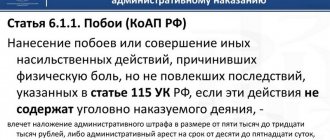Causing physical harm to a person is a serious crime that will result in prosecution. The more severe the injuries sustained as a result of the beating, the more severe the punishment.
But there is no clear answer to the question: what kind of beating of a person will be like. The situations in which the crime occurred can be very different. It is important to understand the difference between an administrative offense and a criminal offense and only then consider what the punishment may be for assault of one degree or another.
Article for beating a minor child
There is no separate article in the Criminal Code for causing harm to a minor. However, the fact of beating a minor is an aggravating circumstance.
Important. A child under 14 years of age is considered a minor, and from 14 to 18 years of age is considered a minor.
You are advised by the best qualified lawyers
Free: Our lawyers provide free initial consultation on any legal issues. 90% of cases are resolved with one free consultation.
24/7: real estate via online chat, or call the hotline 24 hours a day, 7 days a week
The punishment for beating a young child depends on the amount of harm caused:
- clause "b" part 2 art. 111 of the Criminal Code - a criminal can be imprisoned for 10 years;
- clause "c" part 2 art. 112 of the Criminal Code – deprivation of freedom for 5 years;
- clause "g" part 2 art. 117 the offender is imprisoned from 3 to 7 years.
Note!
According to Art. 63 of the Criminal Code, any violation of the law in relation to children under 18 years of age is always considered an aggravated violation. Consequently, the punishment changes upward.
Serious harm to health
The consequences for causing serious harm to health are prescribed in Article 111 of the Criminal Code of the Russian Federation. The following are considered signs of grievous bodily harm:
- disruptions in the functioning of the body due to organ damage or loss;
- lifelong loss of vision, hearing or speech;
- loss of performance by a third;
- inability to carry out professional activities for the rest of life.
Causing serious harm to health is punishable by prison terms. The maximum prison term in the absence of aggravating circumstances is eight years.
Note!
The aggravating factors in this case are the same as when causing harm of moderate severity. Proving that the heavy damage was inflicted on someone else’s order can also make the situation worse for the defendant.
When considering a case, the court may pay attention to the identity of the victim. If the attacker caused damage to a public servant during execution, then this case will be qualified under Article 318 of the Criminal Code of the Russian Federation. The punishment can be up to ten years in prison and a fine of 200 thousand rubles.
The court also takes into account the mitigating circumstances prescribed in Article 61 of the Criminal Code. Taking them into account, the judge can lighten the punishment. The following are considered softening:
- pregnancy;
- minor age;
- difficult life circumstances;
- presence of young children;
- no criminal record;
- confession.
If the perpetrator called an ambulance or provided medical assistance to the victim after the attack, the judge may also consider this a mitigating circumstance. As well as a proven fact of aggression on the part of the victim before causing damage.
Article of the Criminal Code of the Russian Federation for group beating
An offense committed by a group of people is punished much more severely than a crime committed alone. Assault is no exception.
The punishment in the form of imprisonment, according to the following articles, is:
- clause “a”, part 3, art. 111 Criminal Code – up to 12 years;
- item "g" part 2 art. 112 Criminal Code – up to 5 years;
- clause "e" part 2 art. 117 of the Criminal Code - from 3 to 7 years.
Note!
To be punished under these articles, there must be a prior agreement between the accused. If this is not established, then the charge is qualified under paragraph “c” of Part 1 of Art. 63 of the Criminal Code.
Punishment
What punishment is chosen and how many years they give for beating a person is influenced by a number of factors that have already been mentioned.
The maximum term is 15 years, provided for by the most severe article in this area - 111 of the Criminal Code of the Russian Federation - serious injury to health.
Article 111 of the Criminal Code of the Russian Federation . If the victim was deliberately inflicted with serious harm to health, life-threatening, or this led to loss of hearing, vision, speech, internal organ or stoppage of its functioning, termination of pregnancy - punishment is provided in the form of imprisonment for a term of up to 8 years.
A similar punishment is threatened if, after the beating, the victim’s face is disfigured, a mental disorder is diagnosed, or he becomes addicted to drugs (substance abuse), or completely loses his ability to work or at least a third.
The same crime is punishable by imprisonment for up to 10 years, with or without a limitation of up to 2 years, if it is committed:
- In relation to a person performing a public duty, carrying out official activities or his relatives;
- In relation to minors or helpless people, obviously innocent;
- For hooligan reasons/in a generally dangerous manner/for hire/for reasons of hostility/for the purpose of sale, transplantation of organs or tissues/using weapons or objects as such.
Punishment of up to 12 years with or without a limitation of up to 2 years is given when the above crimes are committed by a group of persons or in relation to 2 or more persons.
And if there is a death, the penalty is up to 15 years. In other articles the punishment is less.
What is the penalty for light battery?
For causing minor injuries, the punishment is in accordance with Art. 115 of the Criminal Code. Damage to health is expressed in loss of ability to work for up to 3 weeks. The punishment is:
- fine of up to 40,000;
- compulsory work for up to 1 year;
- detention for up to 4 months.
Note!
Responsibility for the committed actions reflected in Art. 115 of the Criminal Code depends on whether there are aggravating circumstances in the actions. In this case, the offender may face prison for up to 2 years.
In addition to physical damage, beating causes material and moral damage. These actions may be subject not only to criminal liability, but also to filing a claim for damages.
How to file a police report for assault
A criminal case of beating is considered a public-private prosecution, that is, it is initiated only after the victim submits a specific request. Once a case has been initiated, reconciliation between the parties is impossible.
The procedure for filing a complaint about beating is regulated by Art. 141 Code of Criminal Procedure of the Russian Federation. You will need to consider several important nuances:
Before making a statement about the beating, it is advisable to contact any medical institution and record the beatings (record the beatings). It should be remembered that the punishment of the offender will depend on the circumstances surrounding the commission of the crime, on the behavior of the victim, as well as on the severity of the consequences that followed the beating.
If you are at fault for such an accident and are facing prosecution, it is recommended that you seek the assistance of a qualified criminal defense attorney. At least for a preliminary consultation, during which he will consider all the circumstances of the case and talk about his prospects. Well, then decide whether you will need the help of a lawyer in the future or whether you can handle it yourself.
Moderate battery article
Battery of moderate severity constitutes damage to health or loss of ability to work for a long period.
A person cannot fully perform his job, for example, drive a car, cook food, etc.
From a medical point of view, this is when internal organs and skin over large areas of the body are damaged. These injuries do not pose a threat to human life. This also includes mental disorder that occurs when in contact with a criminal.
Very often, due to ignorance of the laws, the victim cannot bring the criminal to justice.
The punishment for assault of moderate gravity is defined in Art. 112 of the Criminal Code and consists:
- restriction of freedom up to 3 years;
- forced labor for up to 3 years;
- arrest up to 6 months;
- imprisonment for up to 3 years.
The origins of the first decriminalization of “assault”
The initiative to reclassify this type of crime came from the Supreme Court of the Russian Federation with the goals of “unloading” the courts, focusing on more dangerous crimes, and freeing those convicted from the inappropriately severe consequences of a criminal case. Vladimir Putin supported this idea, believing that crimes that do not pose a great public danger can be classified as administrative offenses, but repeated commission of the act should already be criminally punishable.
Before the bill was adopted in its final reading, it was decided to equate people who beat their loved ones with hooligans or extremists. This gave rise to public discontent. People dubbed these changes the “Spanking Law” and began to remember the promotion of “juvenile justice” in the country.
What will happen to beating a person and stealing?
The punishment for the actions of the criminal for beating and theft depends on the amount of damage caused to the health of the victim.
Such actions without causing harm to health can be considered in accordance with clauses “a”, “d”, part 2 of Art. 161 of the Criminal Code, as robbery. Those. there is a group theft of property by prior conspiracy and with the use of violent actions, but not dangerous to health.
The punishment in this case is:
- forced labor for up to 5 years;
- imprisonment for up to 5 years;
- fines in the amount of the perpetrator’s monthly income with or without restriction of freedom for up to 1 year.
If damage to health is established, the actions of the perpetrators are considered robbery, in accordance with Part 2 of Article 162 of the Criminal Code. Those. the theft of property occurred with the use of violence that was dangerous to the health or life of the victim, or with threats to use violence, committed by a group of people by prior conspiracy.
Here the punishment is:
- imprisonment for up to 10 years and fines up to 1 million rubles.
- imposition of a fine in the amount of the offender’s income for five years and restriction of freedom for up to 2 years.
What's the result?
Despite the “strikes” of people, the bill amending Art. 116 of the Criminal Code of the Russian Federation was nevertheless adopted.
What follows from this?
- Decriminalization of Article 116 of the Criminal Code of the Russian Federation does not abolish the punishment for beating loved ones, but softens it, and also establishes equal liability for the same act in relation to relatives and strangers .
- In case of repeated beatings, the person is already brought to criminal liability under Art. 116.1 of the Criminal Code of the Russian Federation, and not administrative.
- In case of systematic beatings, Art. 117 of the Criminal Code of the Russian Federation.
- If the line between beatings and causing minor harm to health is erased (that is, the victim will suffer minor harm ), then the offender will be subject to sanctions on the basis of Art. 115 of the Criminal Code of the Russian Federation.
Thus, violence from loved ones will still be punished.
Criminal liability for battery with risk to life
The most common article under which the perpetrator is most often punished is Art. 116 of the Criminal Code. However, the victim often misses the deadline to contact law enforcement agencies, and therefore most of the evidence is lost:
- whether it was hooliganism;
- or the crime occurred for religious reasons or is related to the nationality of the victim;
- whether a weapon or the like of a weapon was used.
According to paragraph 2 of Art. 115 of the Criminal Code, either there can be an arrest for up to 180 days, or the period of arrest is extended to two years.
If there are systematic beatings, the penalty increases according to the following factors:
- number of perpetrators – from 2 people or more;
- the offender used torture or committed other acts that resulted in severe physical and moral harm;
- the criminal act is associated with racial and religious intolerance.
In this case, according to clause 2 of Art. 117 of the Criminal Code, the offender may lose his freedom for up to 7 years. In doing so, the court takes into account the following circumstances:
- how much time the victim needs to recover health;
- Traces of severe injuries were found on parts of the body;
- the person was beaten with particular cruelty;
- the target of the attack is the victim’s organs;
- the victim is a minor citizen;
In this case, the punishment is imprisonment for up to 10 years under strict conditions.
If the crime occurred with the participation of two or more perpetrators, the term is increased by another two years.
Note!
Each case of beating is unique in itself. Educational measures may take the form of correctional labor or penalties. The basis for making a correct decision by the court is an examination to identify the severity of the damage caused.
For minor injuries, the culprit will face up to 2 years of arrest. For average severity of beatings – up to 5 years. In case of severe beating, as a result of which the victim dies - 15 years in prison.
Corpus delicti
Battery (beating) is classified as a criminal act if four mandatory elements are met:
- Objective conditions. Physical actions must be committed that fall under the above-mentioned articles of the administrative or criminal code, these could be: beatings;
- other actions of the offender, after and as a result of which the victim experienced physical pain, but the offender did not cause harm to the health of the victim.
- direct (the criminal realizes that he is committing an illegal act, understands that there will be consequences, but deliberately commits a crime);
In any other case, the event cannot be classified as a crime.
A distinctive feature of this criminal act is the motives for beating the perpetrator, which prompted him to beat the victim. In order for battery to be found guilty, the cause of the crime must be:
- Reasons for thugs. In this case, it is characteristic or insignificant that there is no reason to commit a crime. The following factors will be important here: who exactly (criminal, victim or third party) was the instigator of the conflict;
- whether the quarrel became a formal reason for the long-planned beating;
- it is important to take into account that if the instigator of the conflict was the victim, then the crime will not be classified as committed on the basis of a hooligan;
- if the victim committed illegal actions that subsequently became the reason for his beating, then in this case the beating will not be committed for hooligan reasons.
For example, citizen M constantly beat citizen K because the latter lived in the basement, led an unsociable lifestyle and constantly irritated the criminal with his behavior.
How to bring to justice those who beat a person
A person who has been beaten must immediately file a complaint with the police department and receive a referral for a medical examination.
The application is drawn up in any form. It details the time and place of the incident, describes the harm caused, what was the basis for such actions, as well as the time and place of seeking medical help.
If there are witnesses, their details are indicated. In the end, the victim requests that the perpetrator be brought to justice.
Due to changes in the Criminal Procedure Code that occurred in 2007, when a victim contacts the police, he can expect that the culprit will be found and punished.
According to Art. 20 of the Code of Criminal Procedure of the case under Art. 115,116,129,130 are subject to consideration only at the request of the victim and they are classified as a private charge in criminal proceedings.
Note!
The case can be terminated after the parties have reconciled.
Battery is a light crime and is not prosecuted solely on the basis of the fact of the incident.
If the case is of an exceptional nature, then it can be initiated without a statement. For example, the victim is dependent on the perpetrator or cannot independently protect his interests.
The case is submitted to the magistrate for consideration after filing an application with the judicial authorities, or the prosecutor's office, or the police. All evidence of the criminal's guilt is presented to the court. The consideration of the case takes place in the presence of the accused and the accuser.
The end of the consideration of the case is the adoption of a decision or reconciliation of the parties. Reconciliation can only be achieved before the court retires to the deliberation room and with the consent of the victim and the perpetrator.
Acts with characteristic hooligan motives
In addition to the articles in which hooligan motives are either mandatory or an aggravating feature, which is directly stated in the articles themselves, the Criminal Code contains several rules on crimes for which such motives are most characteristic. These are, for example, the following criminal offenses:
- Vandalism (Article 214 of the Criminal Code of the Russian Federation) - desecration of buildings, structures, etc., damage to property in public places and on public transport. In the absence of qualifying signs, such actions are punishable by arrest for up to 3 months.
- Destruction or damage to objects of cultural heritage, etc. (Article 243 of the Criminal Code of the Russian Federation). The maximum penalty is up to 6 years in prison.
- Desecration of the bodies of the dead and their burial places (Article 244 of the Criminal Code of the Russian Federation) - damage, desecration of burial places of cemetery buildings for funeral or memorial rituals, grave structures, mockery, insulting mockery of dead bodies. In the absence of the qualifying criteria specified in Part 2 of the article, such actions may entail a penalty of arrest for up to 3 months.
Did the article help you?
Not really
Where to go if you are a victim of violence?
If you have been beaten, do not let it go. Even if a loved one or family member showed aggression towards you, this is not a reason to leave the criminal unpunished. For your own safety, immediately seek protection from law enforcement agencies. Below we will tell you how to do this correctly.
First of all, document the damage caused to you at the emergency room. Doctors will give you the appropriate certificate, with which you can go to write a corresponding statement to the local police department or even to the prosecutor's office. Be sure to make sure that the document you submitted is included in the record of the case.
If you did not have the opportunity to visit the emergency room in advance, this problem can also be solved. Just ask the law enforcement officer who is talking to you to independently reflect the fact that you have been injured in the report he draws up.
Like other criminal offenses, battery cases are tried in court. To ensure that your abuser is brought to justice, enlist the support of a good lawyer in advance. A competent lawyer will not only help you win the process by personally representing your interests in the courtroom, but will also take on some of the preliminary hassle, namely: prepare the necessary documents and draw up a corresponding petition in accordance with all the rules.











